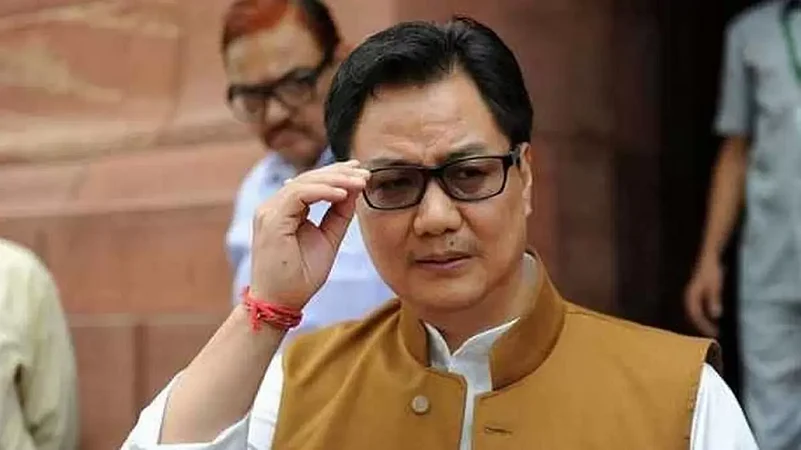The Bharatiya Janata Party (BJP)-led Union government has continued its assault on the BBC documentary on Prime Minister Narendra Modi and the 2002 Gujarat Riots.
The BBC released the first part of its documentary India: The Modi Question last Tuesday. It's critical of Hindutva groups and Modi, who was the Chief Minister of Gujarat at the time of Gujarat Riots. Among other things, the documentary cites a previously unpublished UK government report that said Modi was "directly responsible" for the "climate of impunity" that enabled the Gujarat Riots.
In the latest salvo against the BJP documentary, BJP minister and Union Law Minister Kiren Rijiju lashed out at a media articles on the subject and said that "some people consider BBC above the Supreme Court".
Sharing an article by Tariq Mansoor in The Indian Express on Twitter, Rijiju said, "Minorities or for that matter every community in India is moving ahead positively. India's image cannot be disgraced by malicious campaigns launched inside or outside India. PM Narendra Modi Ji's voice is the voice of 1.4 billion Indians."
In subsequebt tweets, Rijiju lashed out at the "colonial addiction" of people and at the "tukde-tukde gang".
Rijiju said in Hindi, "Some people in India have not left colonial addiction. They consider BBC above teh Supreme Court. They damage their country's dignity and image to such low points just to appease their moral bosses. But we don't have any other expectation from these 'tukde-tukde gang members' whose only goal is to weaken India's power."
The Modi government has also blocked YouTube and Twitter posts containing the link to the BBC documentary. The PTI on saturday reported that such directions were issued by Apurva Chandra, Secretary, Ministry of Information and Broadcasting, on Friday under the emergency powers under the IT Rules, 2021.
Modi govt reaction to BBC documentary
The Modi government has termed the BBC documentary "propaganda piece" and has said that it has bias.
"We think this is a propaganda piece designed to push a particular discredited narrative. The bias, the lack of objectivity, and a continuing colonial mindset, is blatantly visible," said Ministry of External Affairs Spokesperson Arindam Bagchi on the film.
Despite the Modi government blocking the links, users have shared alternate links to access the film.
Trinamool Congress (TMC) MP Mahua Moitra also shared the link and tweeted, "Sorry, Haven’t been elected to represent world’s largest democracy to accept censorship. Here’s the link. Watch it while you can."
What happened in Gujarat Riots?
Communal violence enveloped Gujarat in early 2002 after a fire in a train killed 59 Hindus.
On February 27, 2002, a total of 59 Hindus died in a fire in Sabarmati Express at Godhra, Gujarat. The Bharatiya Janata Party (BJP) of Modi called the incident a "premeditated assault". The Hindutva organisation Vishwa Hindu Parishad (VHP) later said the Gujarat Riots "had to be done". Communal violence broke out after the incident.
In Gujarat Riots, a total of 1,044 people were killed, including 790 Muslims and 254 Hindus, according to government figures cited in media reports.
Though the BJP is now dismissing the claims in the BBC documentary, the VHP earlier admitted its role in the Gujarat Riots. The VHP is a Hindutva organisation that's sided with the BJP in its broader Hindutva agenda, such as the Ram Mandir movement.
VHP Gujarat chief Keshavram Kashiram Shastri told Rediff News in March 2002 that a list of shops owned by Muslims in Ahmedabad was prepared on the morning of February 28, a day after the Godhara incident. The Rediff noted, "Shastri was replying to an allegation that shops in Ahmedabad were looted on the basis of a list prepared by the VHP in advance and that the violence was not a spontaneous outburst against the carnage in Godhra."
Shastri told Rediff, "In the morning we sat down and prepared the list. We were not prepared in advance...It had to be done, it had to be done. We don't like it, but we were terribly angry. Lust and anger are blind."
(With PTI inputs)


























